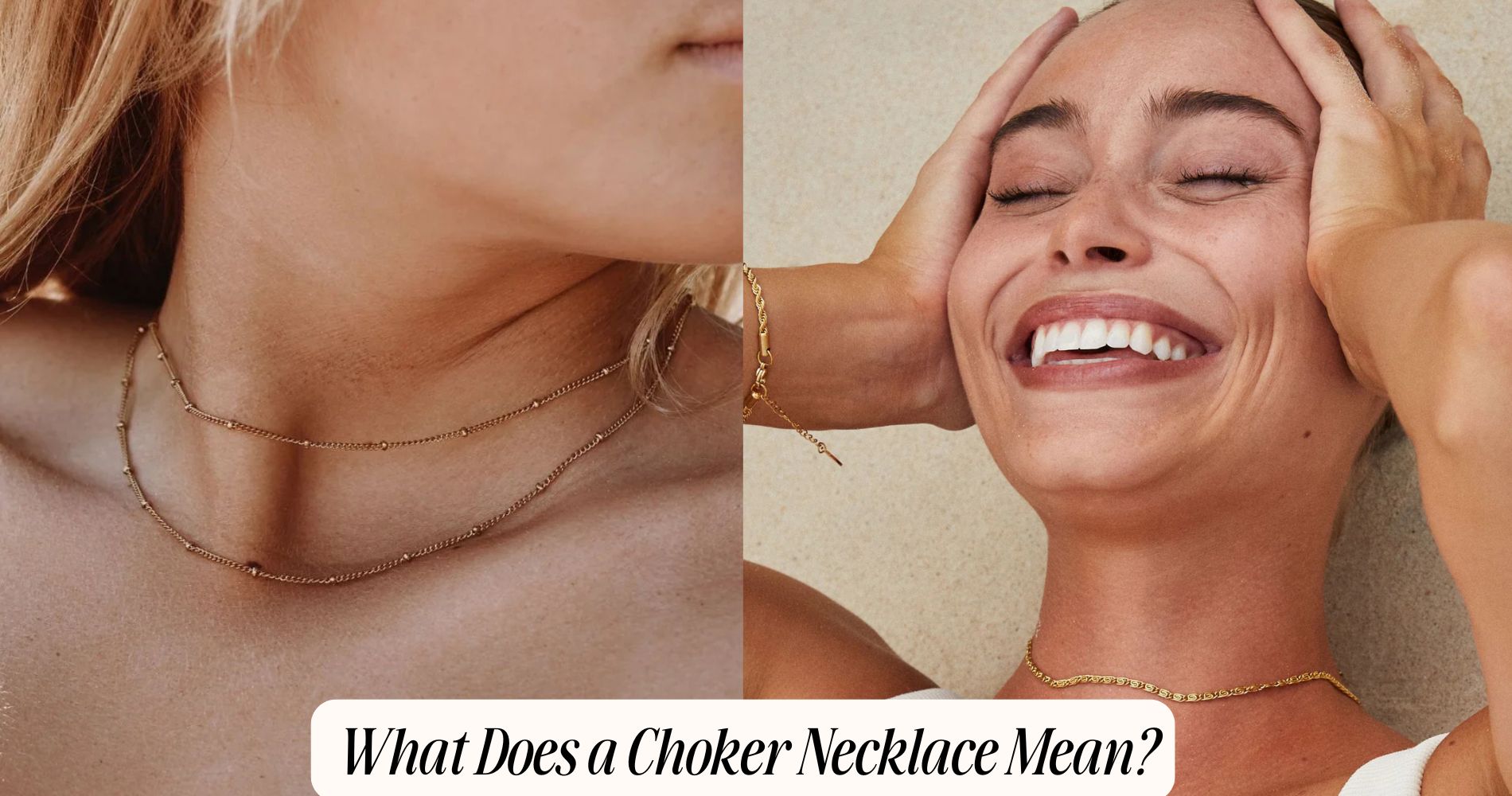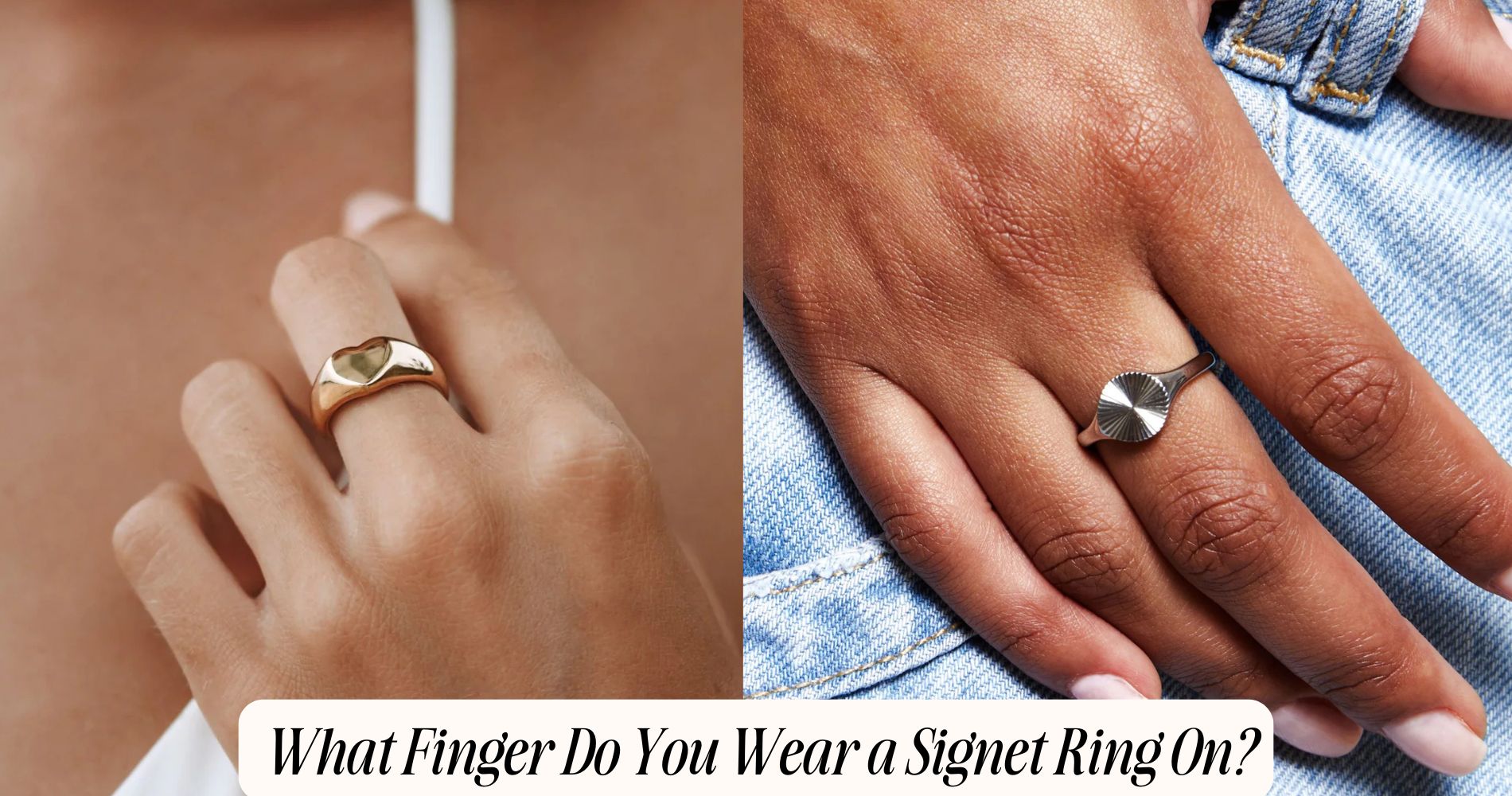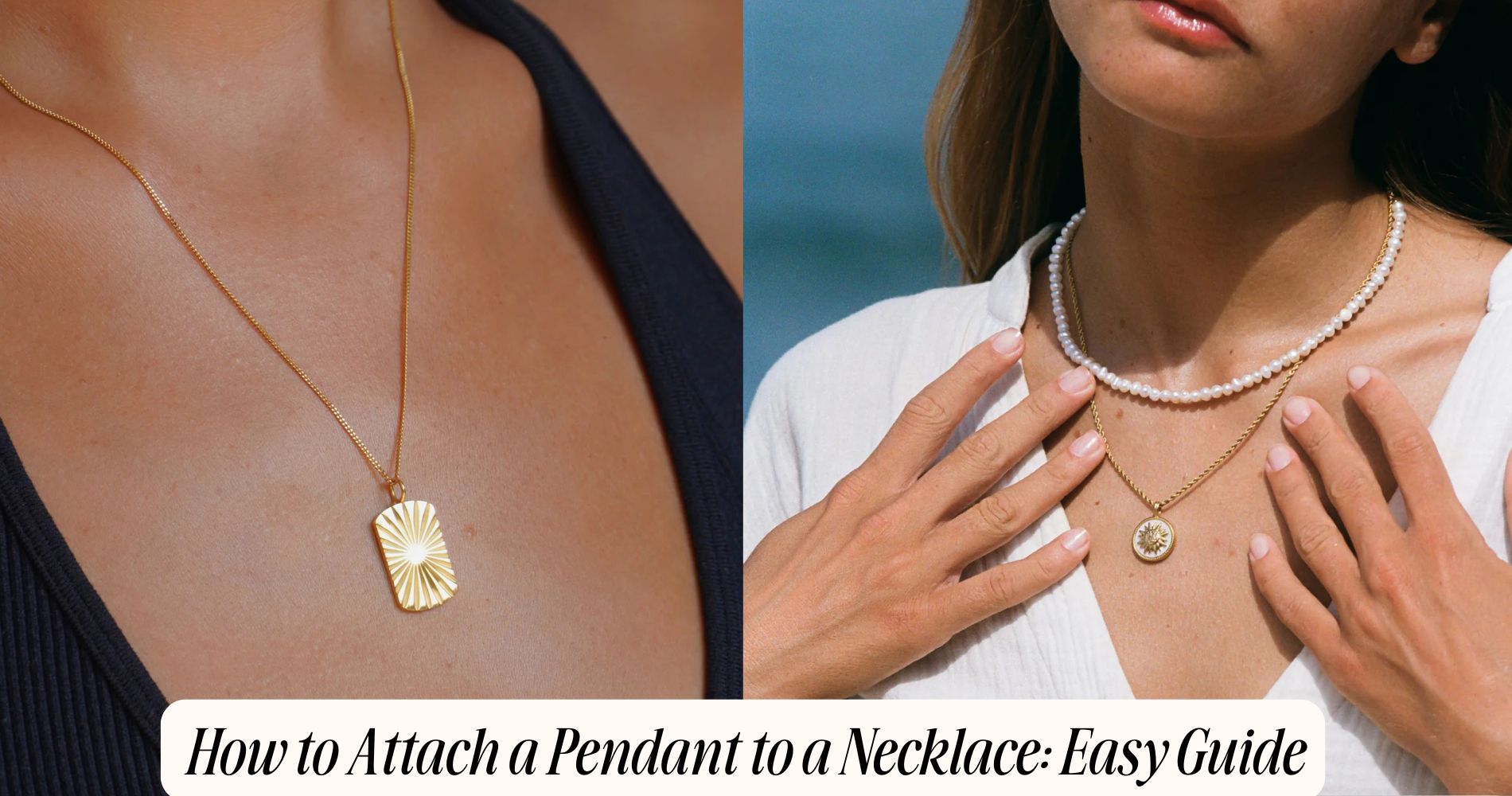
What Does a Choker Necklace Mean?
What does a choker necklace mean? A choker necklace carries a deep significance rooted in cultural heritage and personal expression. Throughout history, chokers have symbolized status and elegance, evolving from the opulent designs of the Renaissance to the edgy, rebellious looks of the 1990s. Today, they serve as bold fashion statements, reflecting individuality and style. Crafted from various materials and designs, chokers can convey messages of beauty, protection, and identity, resonating with cultural themes. If you’re exploring how a choker can tell your story, check out our hypoallergenic necklace collection for styles that suit you perfectly.
Historical Origins of Chokers
Chokers have a fascinating history that dates back centuries, with their origins rooted in various cultures around the world. You'll find that the concept of wearing a tightly fitting necklace has been embraced in different eras, particularly during the Renaissance.
Back then, chokers were often made from luxurious fabrics and adorned with jewels, reflecting the opulence of the time. As you explore this period, you'll see how chokers became a staple in Renaissance fashion, symbolizing both status and elegance.
Fast forward to the Victorian era, and you'll discover Victorian chokers gained immense popularity. These chokers often featured intricate designs, lace, or cameos, and they were worn by women to signify their social standing.
They served not just as accessories but also as expressions of personal style and identity.
As you investigate the historical origins of chokers, it's clear they evolved from simple adornments to powerful fashion statements. Each era contributed to the choker's allure, making it a timeless piece that continues to resonate in modern fashion.
Understanding this history enhances your appreciation for the choker's significance today.
Cultural Significance Through Time
As you explore the cultural significance of choker necklaces, you'll notice how their historical origins and uses have shaped their symbolism in fashion trends.
Different cultures interpret chokers uniquely, reflecting varied meanings and values.
Understanding these aspects will deepen your appreciation for this versatile accessory.
Historical Origins and Uses
Evolving across cultures and centuries, the choker necklace has held various meanings and significance throughout history. In ancient Egypt, women adorned themselves with chokers made from precious materials like gold and lapis lazuli, symbolizing wealth and status.
As you move through time, you'll notice that different cultures embraced choker styles that reflected their values and traditions. For instance, in the Victorian era, chokers made from velvet or lace often served as a symbol of mourning, while in the 1920s, flapper-style chokers became a fashion statement, showcasing a sense of liberation and modernity.
Choker materials varied widely, from simple cotton to ornate gemstones, allowing wearers to express their individuality. In the 19th century, the use of ribbon chokers became popular among women, highlighting their necklines and adding a touch of elegance to their outfits.
As you explore the history of chokers, you'll find that each style and material choice reveals something unique about the wearer's culture and time period. The choker's enduring presence in fashion demonstrates its ability to adapt and resonate with different societal values, making it a timeless accessory.
Symbolism in Fashion Trends
Throughout history, the choker necklace has often symbolized more than just a fashion accessory; it's been a reflection of cultural values and societal shifts. When you wear a choker, you tap into a rich tapestry of meaning that connects personal identity with broader trends in fashion psychology.
In the Victorian era, chokers were associated with femininity and social status, often adorned with precious materials to signify wealth. Fast forward to the 1990s, and chokers became a symbol of rebellion, embraced by subcultures that sought to challenge mainstream norms. By wearing one today, you can express your unique style and connect with these historical narratives, showcasing your personal identity through the choices you make.
Fashion trends evolve, but the choker remains a versatile piece that adapts to changing social landscapes. Whether you opt for a minimalist design or a bold statement piece, you're participating in a dialogue about self-expression and cultural significance.
Ultimately, the choker serves as a powerful reminder of how fashion can reflect individual beliefs and societal values, allowing you to communicate who you're without saying a word.
Cultural Variations and Interpretations
The choker necklace's significance varies widely across cultures and time periods, illustrating how different societies interpret this accessory. In ancient Egypt, for example, chokers symbolized status and power, often worn by royalty and adorned with precious stones.
In contrast, during the Victorian era, choker styles shifted to represent mourning, with black ribbons often signifying a loss.
Fast forward to the 1990s, and chokers became a fashion statement among youth, representing rebellion and individuality. Today, you might wear a choker to express your unique style or to evoke nostalgia for past trends.
Different cultures also attach unique meanings to chokers. For some Indigenous tribes, a choker can signify strength or protection, while in others, it may represent a rite of passage.
The material and design of the choker can enhance its cultural meanings; for instance, leather chokers might carry different connotations than metal or fabric ones.
As you explore choker styles, remember that each one carries its own story. Understanding these cultural variations enriches your appreciation of this versatile accessory and its place in fashion history.
Chokers in Modern Fashion
In today's fashion landscape, chokers have made a striking comeback, enchanting a diverse audience with their blend of nostalgia and contemporary style. You'll find various choker styles that cater to different tastes, from sleek leather bands to embellished lace and even bold statement pieces.
This versatility allows you to express your personality and elevate any outfit, whether you're dressing up for a night out or going for a casual look.
As fashion trends evolve, chokers have seamlessly integrated into everyday wear, becoming a staple accessory. You can layer them with other necklaces for a trendy stacked look or wear them solo for a minimalist vibe.
Designers and influencers have embraced chokers, showcasing them on runways and social media, which has only fueled their popularity.
Whether you choose a classic black velvet piece or a colorful, beaded design, chokers can enhance your wardrobe and add an edgy touch.
Symbolism of Choker Necklaces
Choker necklaces carry rich symbolism that reflects their historical significance and cultural interpretations.
As you explore their origins and variations, you'll find that these accessories have evolved into modern fashion statements with personal meanings.
Understanding their deeper symbolism can enhance your appreciation for this popular jewelry style.
Historical Significance and Origins
Throughout history, various cultures have embraced choker necklaces, often imbuing them with rich symbolism and meaning. You'll find that the origins of chokers can be traced back to ancient civilizations, where they served as protective amulets or signs of status.
In the Victorian era, the choker gained popularity as a royal adornment, symbolizing both elegance and social standing. Women of the upper class wore decorative chokers made of velvet or lace, often adorned with jewels or intricate designs, to complement their high-necked gowns.
During this time, chokers also took on a more personal significance, sometimes representing mourning or remembrance. For instance, a black ribbon choker might signify loss, as it was often worn in memory of a loved one.
As you explore the historical significance of choker necklaces, you'll see how they've evolved over time, adapting to various trends while maintaining their symbolic roots.
From ancient practices to Victorian influence, chokers have consistently conveyed deeper meanings that resonate across generations, linking wearers to the past while allowing for personal expression in the present.
Cultural Interpretations and Variations
Embracing diverse cultural interpretations, choker necklaces have taken on various meanings around the world. In many cultures, these accessories symbolize femininity and strength.
For instance, in some African communities, chokers are worn by women as a sign of beauty and status, often crafted from vibrant beads that reflect regional styles. You'll find that in Victorian England, chokers were associated with high fashion, sometimes worn to signify mourning or aristocratic status.
In the domains of spirituality, chokers can represent protection. In certain Native American traditions, they serve as talismans, believed to ward off negative energies.
Meanwhile, in the LGBTQ+ community, choker necklaces often embody pride and identity, where colors and designs speak volumes about personal expression.
Cultural symbolism varies widely, but the common thread is the choker's ability to convey deeper meanings beyond mere aesthetics.
Whether you're drawn to a minimalist design or an elaborate piece, understanding these interpretations can enhance your appreciation for the choker's rich history.
Modern Fashion Statements
In today's fashion landscape, choker necklaces have emerged as powerful symbols of individuality and personal style. When you wear a choker, you're making a bold statement that reflects your unique taste. These accessories offer an edgy aesthetic that can instantly elevate any outfit, whether you're going for a casual look or something more sophisticated.
Chokers can be styled in countless ways, allowing you to express your creativity. You might layer them with other necklaces to create playful layers that add depth and interest to your ensemble. This versatility means you can mix materials, colors, and designs, showcasing your personal flair while embracing current trends.
Moreover, chokers can serve as a conversation starter, drawing attention to your fashion choices and inviting compliments. You can choose from minimalist designs for a subtle touch or opt for intricate styles that demand attention.
In a world where self-expression is key, wearing a choker helps you stand out, making it a must-have accessory for anyone looking to assert their style in modern fashion. So, go ahead and embrace the choker trend—it's your chance to make a statement!
Chokers Across Different Cultures
Chokers have woven their way through various cultures, each carrying unique meanings and significance. You might be surprised to learn that these necklaces aren't just a modern fashion trend; they've been embraced globally throughout history.
In many indigenous cultures, chokers hold deep spiritual meaning, often symbolizing protection or social status. For instance, Native American tribes use chokers made of leather and beads, signifying strength and identity.
In Europe, during the Victorian era, chokers were popular among the aristocracy, often adorned with jewels or lace. This reflected both wealth and elegance, showcasing how cultural styles evolve.
In contrast, the chokers of the 1990s, popularized by pop culture icons, conveyed a sense of rebellion and youthfulness.
Across different global traditions, chokers signify more than just a fashion statement; they often represent cultural heritage. Whether you're wearing a beaded choker from the Pacific Islands or a simple velvet one, you tap into a rich tapestry of meanings.
Understanding these cultural contexts can deepen your appreciation for the choker necklace and the stories it tells across time and space.
Personal Expression and Style
Wearing a choker can reflect your individuality and style, allowing you to express who you're in a visually striking way. Chokers come in various designs, materials, and colors, making them a versatile accessory to enhance your personal identity.
Whether you prefer a sleek velvet choker or a bold, chunky piece, each choice can serve as a fashion statement that resonates with your unique vibe.
When you choose a choker, you're not just picking an accessory; you're making a declaration about your style. It can complement your outfit, highlight your features, or even convey your mood.
For instance, a delicate lace choker may evoke a romantic feel, while a spiked leather choker might express an edgier side of you.
Frequently Asked Questions
Can Men Wear Choker Necklaces Too?
Absolutely, you can wear choker necklaces too! Choker history shows they've been popular across genders. Explore various choker styles, from simple leather to elaborate designs, and find one that fits your personal style perfectly.
How Do You Properly Measure for a Choker?
To measure for a choker, wrap a flexible measuring tape around your neck where you'd like it to sit. Consider different choker styles and their history to choose the perfect fit and look for you.
Are Chokers Suitable for Everyday Wear?
Absolutely, chokers are perfect for everyday wear! Their fashion versatility makes them ideal for casual styling, effortlessly enhancing your outfits. Whether you're dressing up or down, a choker adds that stylish touch you'll love.
How Do You Clean and Maintain a Choker Necklace?
To clean and maintain your choker necklace, use gentle soap and water for fabric or leather. For metal, a soft cloth works best. Regularly check for wear to guarantee it stays in great shape.
Conclusion
To sum up, choker necklaces carry a rich history and diverse meanings across cultures. Whether you wear one for personal expression, to make a fashion statement, or to connect with its historical roots, chokers can reflect your unique style. Embrace their symbolism and versatility as you incorporate them into your wardrobe. So, go ahead and choose a choker that resonates with you—it's more than just an accessory; it's a piece of art that tells your story.

























Leave a comment
This site is protected by hCaptcha and the hCaptcha Privacy Policy and Terms of Service apply.